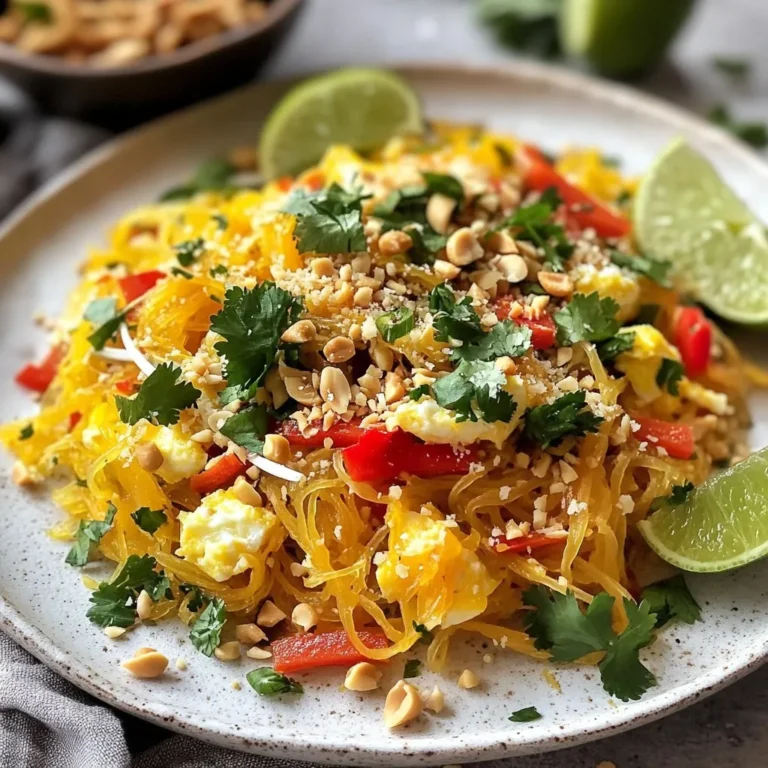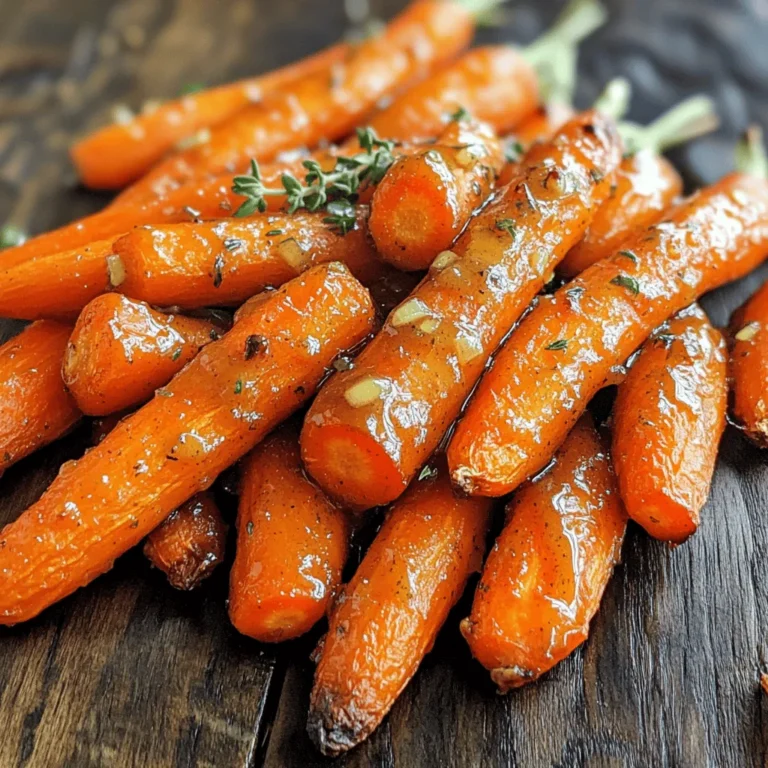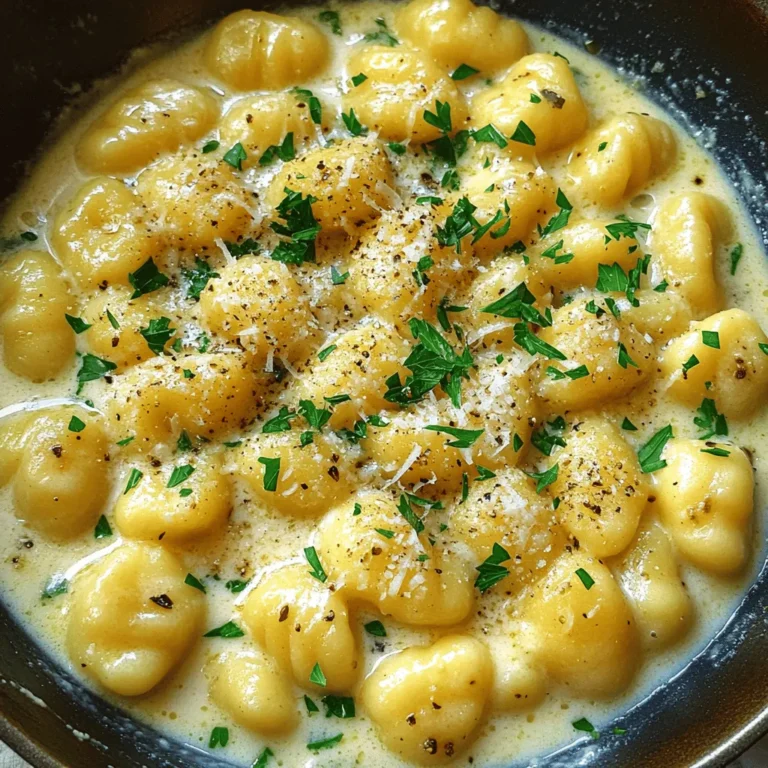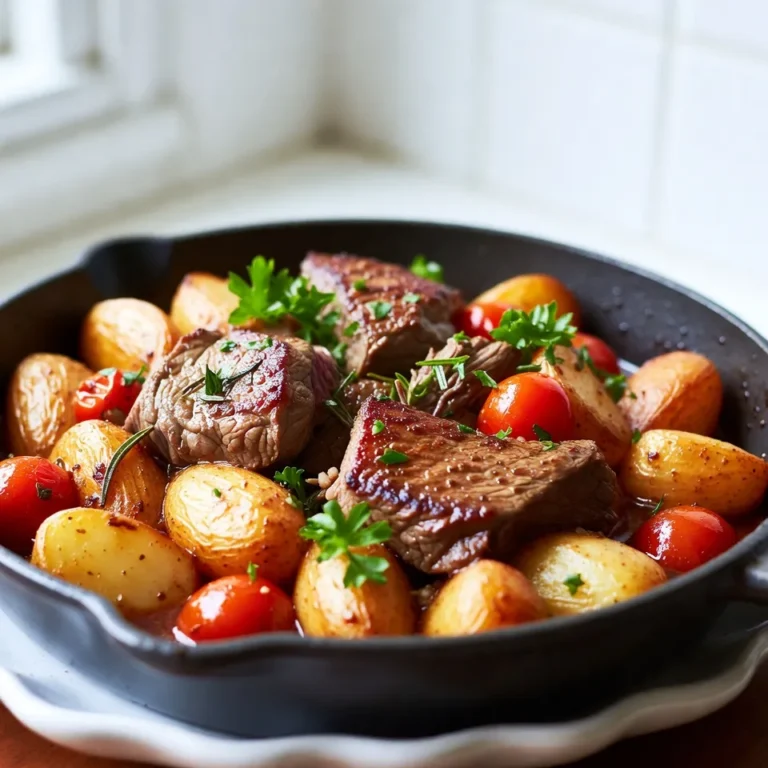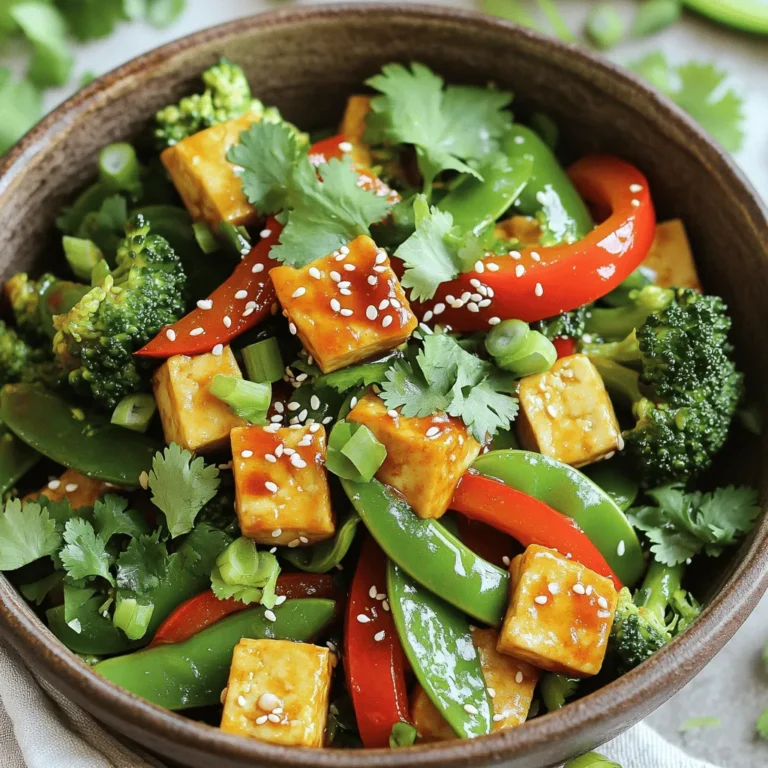Roasted Veggie Buddha Bowls Flavorful and Healthy Meal
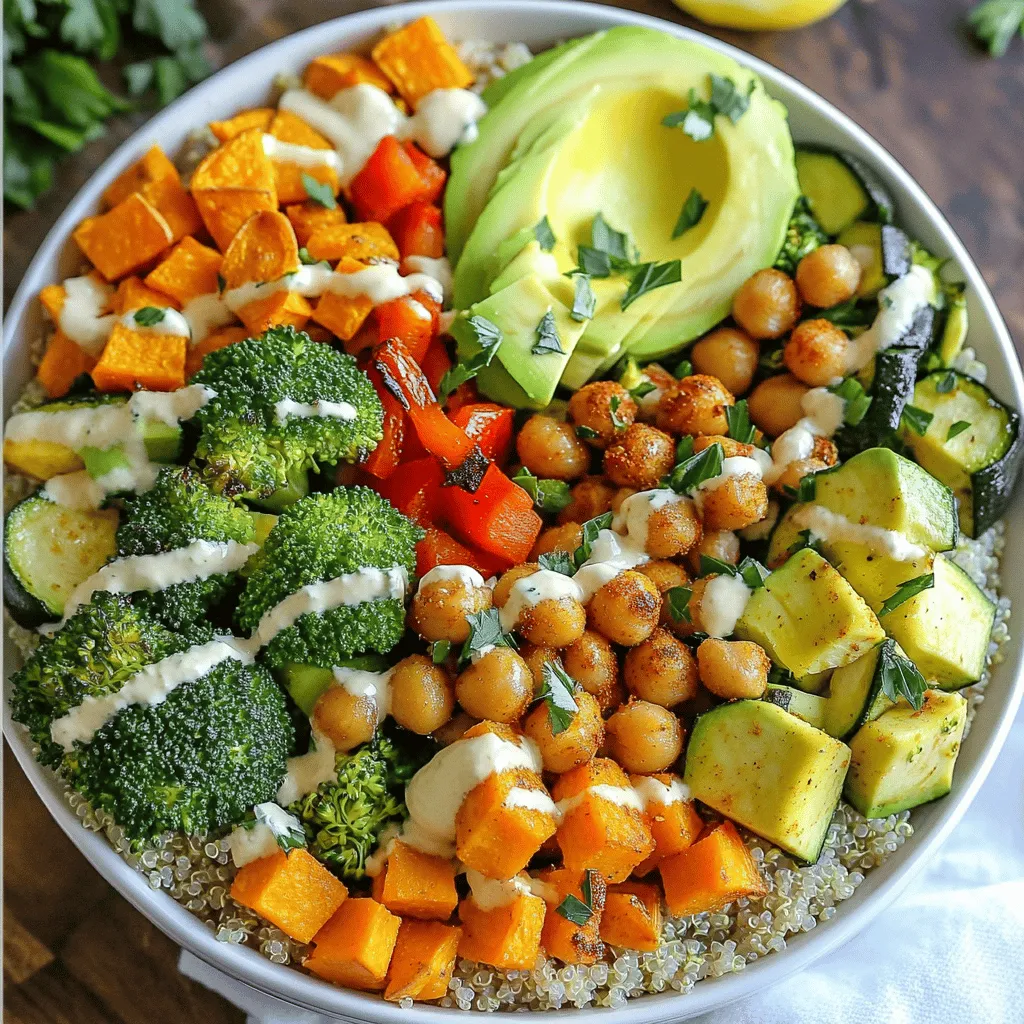
Looking for a tasty, healthy meal? Roasted Veggie Buddha Bowls are your answer! Packed with colorful veggies and nutritious grains, these bowls are simple to make and perfect for any diet. You can mix and match ingredients to fit your taste, plus they’re great for meal prep. Let’s dive into the vibrant world of Buddha bowls and discover how to create a balanced meal that satisfies both your palate and your health goals!
Ingredients
Main Ingredients for Roasted Veggie Buddha Bowls
To make these colorful bowls, gather the following ingredients:
– 1 medium sweet potato, peeled and diced into 1-inch cubes
– 1 cup broccoli florets, washed and trimmed
– 1 red bell pepper, diced into bite-sized pieces
– 1 zucchini, sliced into half-moons
– 1 cup quinoa, thoroughly rinsed under cold water
– 2 cups vegetable broth or water
– 2 tablespoons extra virgin olive oil
– 1 teaspoon smoked paprika
– 1 teaspoon garlic powder
– Salt and freshly cracked black pepper to taste
– 1 ripe avocado, sliced
– 1 cup canned chickpeas, drained, rinsed, and patted dry
– Juice from 1 fresh lemon
– Fresh parsley, finely chopped for garnish
Optional Ingredients for Customization
You can add your favorite ingredients to make the dish your own. Try:
– Spinach or kale for extra greens
– Roasted nuts or seeds for crunch
– Feta cheese or tofu for protein
– Different spices like cumin or chili powder for flavor
– Hot sauce for a spicy kick
Nutritional Benefits of Each Ingredient
Each ingredient in these bowls packs a punch of nutrition:
– Sweet potato: High in vitamins A and C, great for your immune system.
– Broccoli: Rich in fiber and vitamins K and C, supports heart health.
– Red bell pepper: Full of antioxidants and vitamin C, boosts skin health.
– Zucchini: Low in calories and high in water, helps with hydration.
– Quinoa: A complete protein, offers all nine essential amino acids.
– Olive oil: Contains healthy fats that promote heart health.
– Chickpeas: High in protein and fiber, keeps you full longer.
– Avocado: Packed with healthy fats and vitamins, supports brain health.
– Lemon juice: High in vitamin C, aids digestion and detox.
– Parsley: Offers antioxidants and boosts your immune system.
These ingredients come together to create a vibrant meal that is both flavorful and healthy.
Step-by-Step Instructions
Preheating the Oven
Start by preheating your oven to 425°F (220°C). A hot oven helps the veggies roast well. This step is key for getting that nice char and flavor.
Preparing and Seasoning the Vegetables
Grab a large, rimmed baking sheet. On it, put the diced sweet potato, broccoli florets, chopped red bell pepper, and sliced zucchini. Drizzle the mix with 2 tablespoons of extra virgin olive oil. Sprinkle 1 teaspoon of smoked paprika, 1 teaspoon of garlic powder, and add salt and pepper to taste. Toss everything together until all the veggies are coated well in the oil and spices.
Roasting the Vegetables and Cooking the Quinoa
Spread the veggies in a single layer on the baking sheet. Roast them for 25-30 minutes. Stir them halfway through for even cooking. While the veggies roast, it’s time to cook the quinoa. Bring 2 cups of vegetable broth or water to a boil in a medium saucepan. Once it boils, add 1 cup of rinsed quinoa and lower the heat. Cover and let it simmer for about 15 minutes. The quinoa will be fluffy when done. Let it sit covered for 5 minutes off the heat.
Assembling the Buddha Bowls
Now, for the fun part! In each bowl, add a generous scoop of quinoa. Next, layer on your roasted veggie medley. Top it with slices of creamy avocado and seasoned chickpeas. Drizzle some fresh lemon juice over the top and finish with a sprinkle of finely chopped parsley. This adds a pop of color and freshness. Enjoy your Roasted Veggie Buddha Bowls!
Tips & Tricks
Best Practices for Roasting Vegetables
To get the best flavor from your veggies, follow these tips:
– Cut vegetables into even sizes. This helps them cook at the same rate.
– Use a rimmed baking sheet. It catches juices and prevents spills.
– Don’t overcrowd the pan. Give your veggies space to brown.
– Toss halfway through cooking. This helps them cook evenly and adds crispness.
– Experiment with cooking times. Some veggies need more time than others.
How to Cook Perfect Quinoa
Cooking quinoa is easy if you follow these steps:
– Rinse the quinoa well before cooking. This removes the bitter coating called saponin.
– Use a 2:1 ratio of liquid to quinoa. This ensures fluffy grains.
– Bring the liquid to a boil first, then add quinoa. This helps it cook evenly.
– Cover and simmer for about 15 minutes. Once done, let it sit covered for 5 minutes.
– Fluff it with a fork before serving. This makes it light and airy.
Flavor Boosting Ideas for Sauces and Dressings
To elevate your Buddha bowls, try these ideas:
– Mix lemon juice with tahini for a creamy dressing.
– Use balsamic vinegar and honey for a sweet tang.
– Blend avocado with garlic and olive oil for a rich sauce.
– Add fresh herbs like basil or cilantro for a burst of flavor.
– Drizzle chili oil for a spicy kick.
With these tips, your roasted veggie Buddha bowls will be tasty and satisfying.
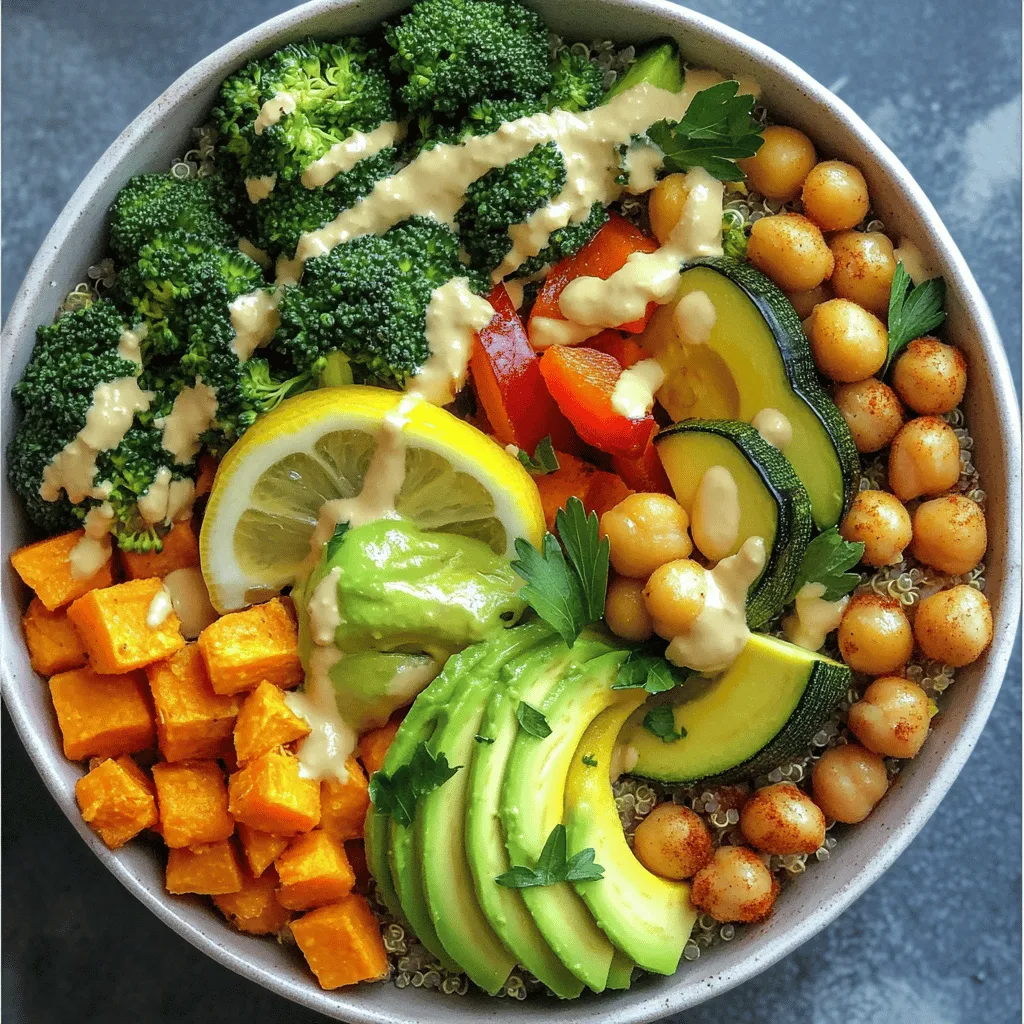
Variations
Vegan and Vegetarian Adaptations
Buddha bowls fit both vegan and vegetarian diets. To keep it vegan, simply skip any dairy toppings. Use plant-based dressings, like tahini or a simple lemon vinaigrette. You can add nuts or seeds for protein and crunch. For vegetarians, consider adding cheese for a creamy twist.
Grain Alternatives
Instead of quinoa, you can use other grains. Brown rice is a great choice. Farro or barley can add unique flavors and textures. You may also try couscous for a quick and easy option. Each grain brings its own taste and nutrients to the bowl.
Seasonal Vegetable Suggestions
Use seasonal veggies for the freshest taste. In spring, try asparagus and peas. In summer, zucchini and tomatoes shine bright. Autumn calls for root vegetables like carrots and beets. In winter, use hearty greens like kale or Brussels sprouts. This way, your bowls stay colorful and delicious all year round.
Storage Info
Proper Storage Techniques for Leftovers
Store your leftover Buddha bowls in airtight containers. This keeps your food fresh. You can separate the quinoa, veggies, and toppings if you want. Use glass or plastic containers that seal well. This helps to maintain texture and flavor. Cool the bowls to room temperature before sealing. This prevents moisture buildup, which can spoil your meal.
Reheating Tips for Optimal Taste
When you reheat your Buddha bowls, do it gently. Use the microwave or stovetop. If using the microwave, cover the bowl with a damp paper towel. This keeps moisture in and prevents drying. Heat in short bursts, stirring in between. On the stovetop, add a splash of water. This helps steam the veggies while heating. Aim for a warm, not hot, meal to keep the flavors balanced.
How Long Do Roasted Veggie Buddha Bowls Last?
Roasted Veggie Buddha Bowls can last in the fridge for about 3 to 5 days. Make sure to check for any off smells or changes in texture before eating. If stored properly, you can enjoy your meal without worry. For longer storage, freeze individual portions. They can last up to 3 months in the freezer. Just remember to label your containers with the date.
FAQs
What is a Buddha Bowl?
A Buddha bowl is a colorful dish filled with healthy foods. It usually has grains, veggies, and protein. You can make it look pretty by arranging the food in sections. Each bowl is a feast for the eyes and the body. You can customize it with your favorite flavors and ingredients. This dish brings a balance of nutrients, making it a complete meal.
Can I substitute ingredients in this recipe?
Yes, you can swap out ingredients in this recipe. You can use any veggies you like, such as carrots or asparagus. If you don’t have quinoa, try brown rice or couscous. You can also change the protein. Use beans, tofu, or even meat if you prefer. The key is to keep the flavors balanced and fresh.
How do I make this dish gluten-free?
To make this dish gluten-free, use gluten-free grains. Quinoa is a great choice since it is naturally gluten-free. Also, check your spices and dressings for hidden gluten. Most of the ingredients in this recipe, like veggies and chickpeas, are gluten-free. With these swaps, you can enjoy a tasty, gluten-free Buddha bowl.
Can I meal prep Roasted Veggie Buddha Bowls ahead of time?
Absolutely! Meal prepping Buddha bowls is easy and fun. You can roast the veggies and cook the quinoa in advance. Store them in separate containers in the fridge. When you’re ready to eat, assemble your bowl with fresh avocado and chickpeas. This way, you save time and enjoy healthy meals all week.It includes all the details you need to create this delicious meal. Enjoy making it!
Roasted Veggie Buddha Bowls are simple and healthy. We explored key ingredients and their benefits. I shared easy steps for preparation and roasting. You learned tips for perfect results and flavor boosts. Variations let you adapt to your taste or diet. Proper storage keeps leftovers fresh. Overall, these bowls offer delicious nutrition and endless customization. Enjoy making your own healthy bowl!
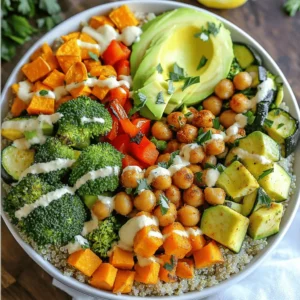

![To make these crispy fish tacos, gather these key items: - 1 lb white fish fillets (cod or tilapia work great) - 1 cup all-purpose flour - 1 cup cornmeal - 1 teaspoon paprika - 1/2 teaspoon cayenne pepper - 1/2 teaspoon garlic powder - 1/2 teaspoon salt - 1/4 teaspoon black pepper - 2 large eggs, beaten - Vegetable oil, for frying - 8 small corn tortillas The toppings add flavor and texture to your tacos. Here are my favorites: - 1/2 cup red cabbage, thinly sliced - 1 avocado, sliced - Fresh cilantro leaves, for garnish - Lime wedges, for serving To round out your meal, consider these sides: - Fresh salsa for a zesty kick - A drizzle of spicy crema for creaminess - Mexican rice for a hearty addition These ingredients make crispy fish tacos a fun and tasty weeknight meal. For the full recipe, be sure to check out the details above! Start by drying the fish fillets with paper towels. This step helps the coating stick better. Cut the fish into strips that are about 1 inch wide. This size cooks evenly and fits nicely in the tacos. In a medium bowl, mix the flour, cornmeal, paprika, cayenne pepper, garlic powder, salt, and black pepper. Stir until well combined. In another bowl, beat the eggs until smooth. This egg wash will help the coating stick. Heat about 1 inch of vegetable oil in a large skillet over medium-high heat. Check if the oil is hot by dropping in a pinch of the flour mix; if it sizzles, it's ready. Dip each fish strip into the egg wash, letting excess drip off. Then coat it in the flour mixture, pressing lightly to ensure it sticks. Place the coated fish in the hot oil, frying in batches to prevent overcrowding. Cook for 3-4 minutes on each side until golden brown. Transfer the fried fish to a plate lined with paper towels to absorb extra oil. Warm each corn tortilla in a dry skillet for about 30 seconds on each side. This makes them soft and easy to fold. For each tortilla, place 2-3 pieces of crispy fish. Top with sliced red cabbage, avocado, and fresh cilantro. Don’t forget to serve the tacos with lime wedges. A squeeze of lime adds a bright, fresh flavor. For the full recipe, you can check the complete details above. To get that perfect crunch, follow these steps: - Dry the Fish: Start by patting the fish fillets with paper towels. This removes moisture and helps them get crispy. - Use Cornmeal: Mixing cornmeal with flour gives extra texture and crunch. It makes the coating thicker and crispier. - Hot Oil: Make sure the oil is hot enough before frying. If it’s too cool, the fish will absorb oil and turn soggy. - Don’t Overcrowd: Fry the fish in batches. Too many pieces at once cools the oil and affects crispiness. Here are some common mistakes you should steer clear of: - Skipping the Egg Wash: The egg wash helps the coating stick. Don’t skip this step! - Not Heating the Oil Properly: Always test the oil. If it’s not hot, you’ll end up with greasy fish. - Using Wet Fish: Wet fish won’t fry well. Always dry them before coating. - Flipping Too Soon: Let the fish cook fully on one side before flipping. This helps it stay intact and crispy. Enhance your tacos with these tasty garnishes: - Fresh Cilantro: Adds a burst of freshness and color. - Avocado: Creamy avocado pairs well with crispy fish. - Lime Wedges: A squeeze of lime brightens up the flavors. - Salsa or Crema: A drizzle of spicy crema or your favorite salsa adds flavor and moisture. For the full recipe, check out [Full Recipe]. {{image_4}} If you want to try a different protein, shrimp works great. Just peel and devein before cooking. You can also use chicken strips. They need a bit more time to cook, so adjust frying time. Another option is tofu for a different texture. Press it to remove water and cut into strips. For a vegetarian twist, use cauliflower. Cut it into small florets, coat, and fry. It gets nice and crispy. If you want a vegan option, tempeh is fantastic. Slice it thin and marinate for flavor before frying. Just make sure to use a plant-based egg wash or a mixture of flour and water. To boost flavor, add lime zest to the coating mix. It brightens each bite. For spice, increase the cayenne pepper in the coating. You can also create a spicy sauce for drizzling on top. Mix yogurt or mayo with hot sauce for a creamy kick. Fresh herbs like cilantro or parsley can add freshness too. These variations keep the dish exciting, ensuring you can enjoy crispy fish tacos in many ways! Try out the full recipe to explore these options. To keep your crispy fish tacos fresh, store leftovers in an airtight container. Place the fish in one container and the toppings in another. This keeps the fish crispy and the toppings fresh. You can also wrap the tortillas in foil for better storage. To reheat, use the oven or an air fryer for best results. Preheat your oven to 350°F (175°C). Place the fish on a baking sheet and bake for about 10 minutes. If using an air fryer, heat it to 350°F (175°C) and fry for 5 minutes. This way, the fish stays crispy. Cooked fish lasts about 2-3 days in the fridge. Fresh toppings, like cabbage and avocado, can last 1-2 days. Store each item separately. If you have leftover tortillas, they can stay fresh in a sealed bag for up to a week. Always check for signs of spoilage before using any of the ingredients. For the full recipe, check the complete list of ingredients. I recommend using white fish like cod or tilapia. These fish have a mild flavor and cook well. They stay tender inside while getting crispy on the outside. Other good options include haddock or snapper. Yes, you can prepare the fish ahead of time. Cut the fish into strips and coat them. Keep the coated fish in the fridge for up to an hour. This helps the coating stick better when you fry them. If you can't find corn tortillas, flour tortillas are a good choice. You can also use lettuce leaves for a low-carb option. They add a nice crunch and freshness to your tacos. Crispy fish tacos can be gluten-free if you use gluten-free flour. Make sure to check the labels on your ingredients. Corn tortillas are naturally gluten-free, so they work well for this dish. For the best results, use gluten-free breadcrumbs or a gluten-free flour blend for coating the fish. Crispy fish tacos are a fun dish to make at home. We discussed key ingredients, topped it with tasty options, and paired it with sides. The steps from preparing the fish to frying it were simple and clear. Use my tips for crispy results and avoid common mistakes. You can also explore variations for flavors and dietary choices. Proper storage will keep your tacos fresh. Now, enjoy making and sharing your crispy fish tacos! They’re sure to impress.](https://goldendishy.com/wp-content/uploads/2025/06/e15c4a6f-d152-43b4-ae39-d2f9004115b6-768x768.webp)
